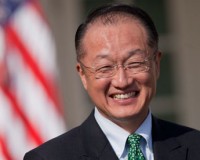 “This should be a wake-up call to the global community not to dismiss these countries as lost causes. These signs of progress do signal that development can and is being achieved, even amid fragility and violence. But the challenges ahead for many countries are extremely tough. While these successes offer hope, the reality is that far too many fragile and conflict-affected countries lag behind the rest of the world. We need to offer timely and critical support to improve the lives of people living in these fragile countries.” World Bank President Jim Yong Kim, May 1, 2013.
“This should be a wake-up call to the global community not to dismiss these countries as lost causes. These signs of progress do signal that development can and is being achieved, even amid fragility and violence. But the challenges ahead for many countries are extremely tough. While these successes offer hope, the reality is that far too many fragile and conflict-affected countries lag behind the rest of the world. We need to offer timely and critical support to improve the lives of people living in these fragile countries.” World Bank President Jim Yong Kim, May 1, 2013.
Background
Two years ago, when the World Development Report on Conflict, Security and Development (WDR) was released it reported no low-income fragile or conflict affected country had achieved a Millennium Development Goal (MDG). Now an analysis into data from the 2013 Global Monitoring Report shows despite enduring political and economic challenges, 20 fragile and conflict-affected states have recently met one or more targets under the MDGs. Eight fragile and conflict-affected states – including Guinea, Nepal, Bosnia and Herzegovina, and Timor-Leste – have already met the target to halve extreme poverty – the number of people living on less than $1.25 a day. Nepal and Bosnia Herzegovina stand-out as fragile states with the most success in meeting MDG targets. The signs of progress reflect accelerated development as well as better quality data and monitoring, although lack of data remains a challenge in many countries. But that doesn’t mean we should be complacent. With less than 1,000 days to meet the MDGs deadline, the challenges in fragile and conflict-affected countries still loom large with only about 20 percent of fragile and conflict-affected countries now meeting the MDGs poverty target. Signs of success are themselves fragile, progress can be reversed for countries lapsing into conflict.
How we are helping
The World Bank Group sees its work in fragile and conflict-affected states as fundamental to delivering on its own goal to end extreme poverty by 2030. The Bank has heeded the call of the WDR and also the calls of the g7+ group of fragile states – which stretch from Africa to the Pacific – to fundamentally change the way it engages in fragile states to meet the challenge to provide citizens justice, security and jobs.
- The Bank is pushing new frontiers on justice – moving beyond just helping to build courthouses or setting up a legal framework in a country. It’s analyzing what best fits a country’s needs. For example, in Sierra Leone an innovative approach to accountability uses paralegals and community compacts between people and clinics to improve health services.
- On security, the Bank is expanding beyond earlier work in Disarmament, Demobilization and Reintegration, and using a variety of means to help governments address crime and violence. Lessons learned in Latin America are now informing projects in Africa and East Asia.
- The Bank is deepening its partnerships, especially with the United Nations, to bridge the traditional security, development and humanitarian divides.
- The Bank’s fund for the poorest, IDA, has since 2000, provided more than $22 billion in support for fragile and conflict-affected countries, including projects immunizing about 10 million children and delivering ante-natal care to about 1.5 million women.
The Bank has embarked on a series of internal reforms to enhance its effectiveness in fragile and conflict-affected states, which include:
- Designing country strategies to better address the drivers of conflict and fragility and leveraging instruments across the Bank Group to support countries, especially in job creation and private sector development. For instance, joint business plans are being developed in Haiti, Cote-d’Ivoire, Nepal, and Myanmar.
- Adopting operational policies and practices specially designed for fragile and conflict-affected states to recognize the unique challenge of working in these volatile, high risk and low capacity environments.
- Strengthening staffing policies to get the right people to the right places at the right time in a cost effective and sustainable manner.
- Supporting a global community of practice on fragility and conflict to generate knowledge. The Center on Conflict, Security and Development (CCSD) with staff in Nairobi and Washington is supporting frontline teams, encouraging the flow of knowledge, and improving how we learn from implementation, including promoting global communities of practices around jobs, security, justice, and natural resource revenue management.
- Putting in place an intensive monitoring system to track progress in fragile and conflict-affected states


